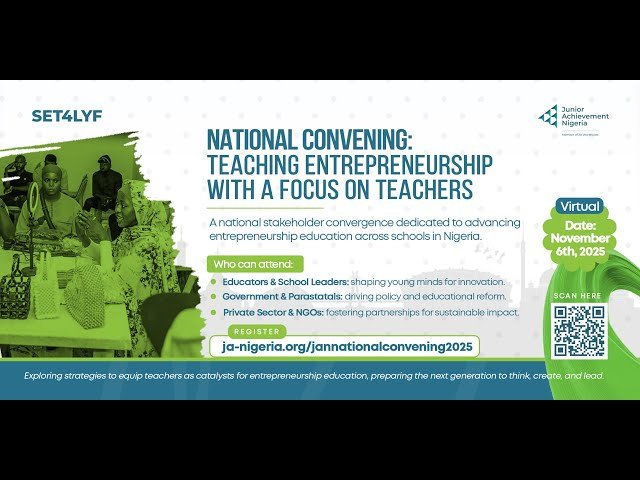In an inspiring push to reshape how entrepreneurship is taught in Nigerian schools, Junior Achievement Nigeria has announced its upcoming National Convening on Teaching Entrepreneurship with a Focus on Teachers, which will be held on Thursday, November 6, 2025. The event aims to equip educators with the mindset, skills, and resources to help students develop entrepreneurial thinking from an early age.
The initiative, tagged SET4LYF (Skill, Employability, and Transition for Life), is not just another conference. It represents a new direction in education—where teachers are recognised as the primary drivers of change in preparing students for the realities of today’s economy. In a country where youth unemployment remains high and the job market is increasingly competitive, the event underscores the urgent need to raise a generation of self-reliant, creative thinkers.
Speaking at a pre-event briefing, Junior Achievement Nigeria’s Country Director, Olaolu Akogun, stressed that the convening is designed to “bring more stakeholders, government agencies, and development partners on board.” He added that inclusion is central to the programme’s structure, noting that “for anything to thrive, it needs the right environment. We need the support of the government in this.”
By shifting attention to teachers, Junior Achievement Nigeria is championing an often-overlooked truth: before students can learn to innovate, teachers must first be empowered to teach innovation.

Table of Contents
A Nationwide Initiative with an Inclusive Vision
One of the remarkable features of the SET4LYF initiative is its ambitious scope. According to Junior Achievement Nigeria, the programme will reach 31 states across the federation, ensuring that educators from diverse backgrounds—urban and rural alike—gain equal access to entrepreneurial training and resources.
But inclusivity goes beyond geography. The initiative reserves 5% of participation slots for girls with disabilities and 10% for internally displaced girls, ensuring that vulnerable groups are not left behind in Nigeria’s drive towards a more enterprising generation. This deliberate inclusion is a testament to Junior Achievement Nigeria’s commitment to equity and access, two values central to the organisation’s broader mission of youth empowerment.
Teachers will be placed at the heart of the event, not as passive listeners but as active contributors. Workshops, panel discussions, and training sessions will focus on helping them translate entrepreneurship concepts into classroom realities. The idea is to shift education from rote memorisation to real-world application—where students learn to identify problems, create solutions, and build businesses even before graduation.
This teacher-first approach acknowledges that transformation in education must start from the foundation. As Mr Akogun pointed out, “Teachers are the bridge between curriculum and creativity. If we empower them, the ripple effect on students will be massive.”

The Convening: A Platform for Ideas, Policy, and Action
The national convening, to be hosted in Lagos, is expected to attract education policymakers, private-sector leaders, government representatives, and civil society organisations. Each group will bring a unique perspective to the central question: how can Nigeria’s education system evolve to produce job creators rather than job seekers?
Junior Achievement Nigeria plans to use the event to foster cross-sector partnerships that can support entrepreneurship education at every level—from primary school to tertiary institutions. Panel sessions will discuss practical strategies such as integrating entrepreneurship modules into teacher training colleges, using technology to support experiential learning, and providing funding opportunities for youth-led start-ups born from classroom ideas.
Participants will also explore how teachers can collaborate with local businesses and innovation hubs to give students hands-on exposure to entrepreneurship. By connecting schools with industries, Junior Achievement Nigeria hopes to close the gap between classroom knowledge and the real world.
This approach aligns with Nigeria’s broader goals under the National Policy on Education, which calls for developing entrepreneurial and vocational skills to combat unemployment and poverty. With over 60% of the population under 25, creating opportunities for young Nigerians through teacher-led entrepreneurship education could have a long-lasting impact on the economy.

Building a Culture of Innovation for the Future
At its core, the upcoming convening represents more than a one-day event—it is a movement to redefine education in Nigeria. Junior Achievement Nigeria envisions classrooms where entrepreneurship becomes part of everyday learning, where students are encouraged to think critically, take initiative, and build sustainable ventures that address local challenges.
This vision aligns with global trends. Across Africa and beyond, countries are beginning to prioritise entrepreneurship education as a catalyst for economic growth. What makes Junior Achievement Nigeria’s approach distinctive, however, is its emphasis on teachers as the first agents of transformation. Instead of importing foreign models, the organisation is crafting a locally grounded strategy that recognises the unique realities of Nigerian classrooms.
The potential impact is vast. By the end of the convening, hundreds of teachers will have gained exposure to modern teaching tools, access to mentorship networks, and the confidence to nurture entrepreneurial mindsets among their students. The ripple effect could transform not just individual schools, but entire communities.
In the long term, Junior Achievement Nigeria hopes this initiative will inspire stronger collaboration between educators, government ministries, and private enterprises. If sustained, such partnerships could redefine how Nigerian students prepare for life beyond the classroom—turning education into a platform for innovation, resilience, and national development.
Join Our Social Media Channels:
WhatsApp: NaijaEyes
Facebook: NaijaEyes
Twitter: NaijaEyes
Instagram: NaijaEyes
TikTok: NaijaEyes
READ THE LATEST EDUCATION NEWS




